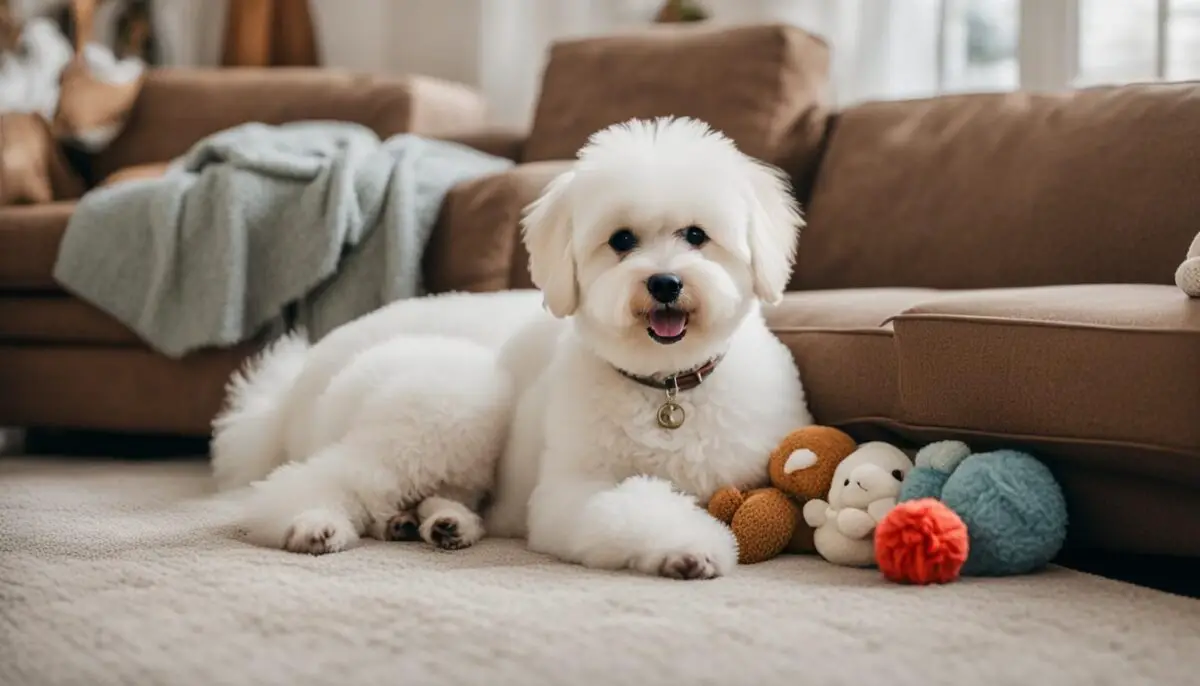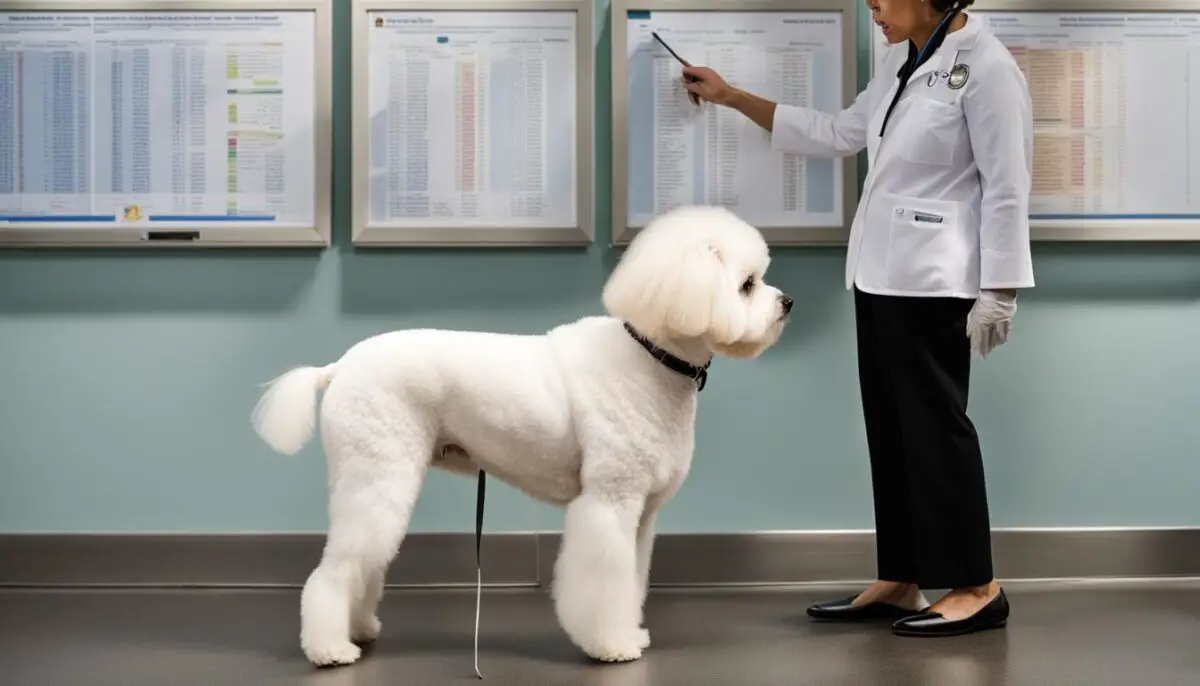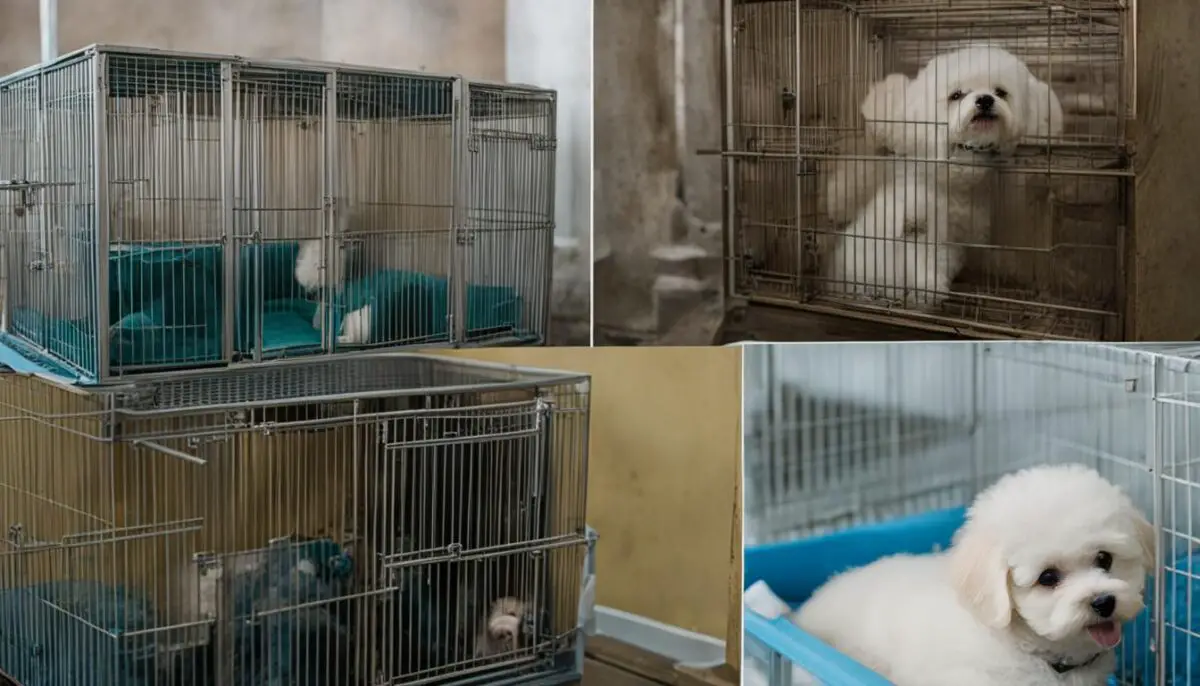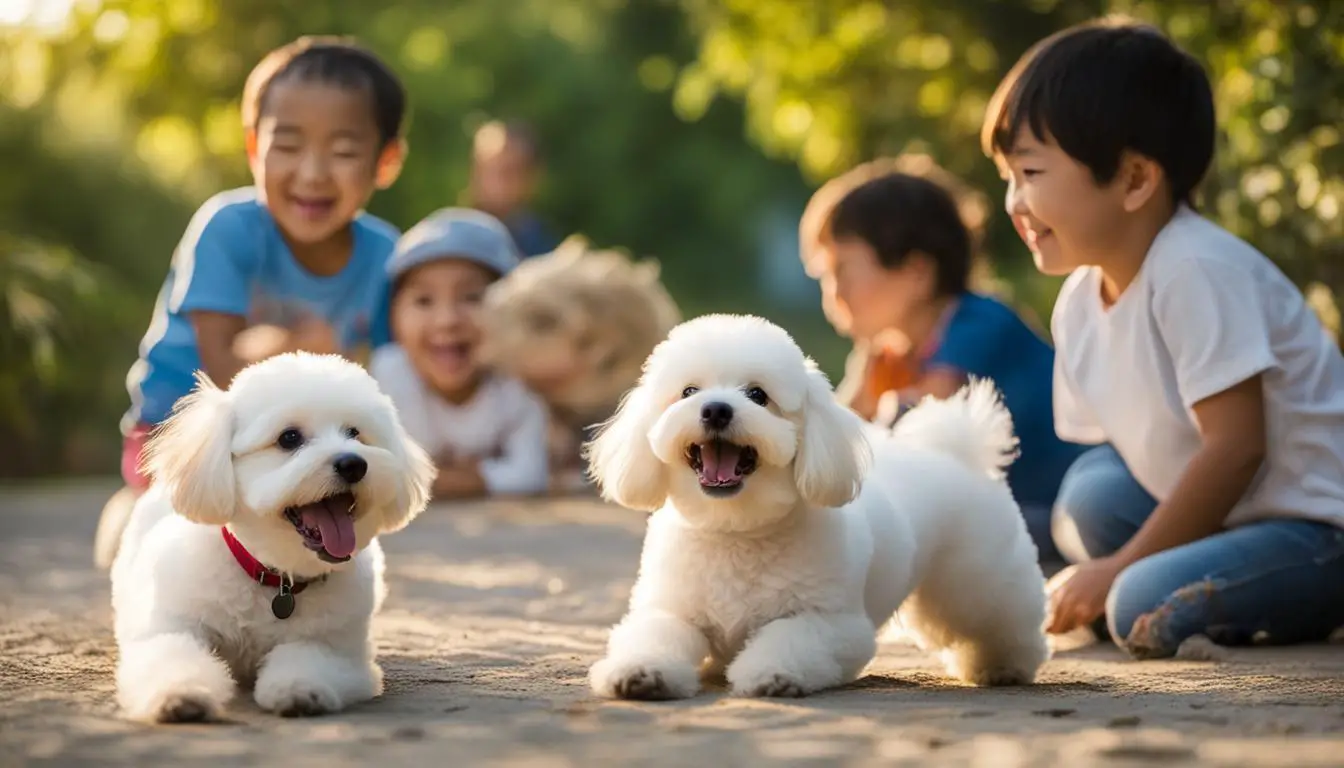The Bichon Frise is a small breed known for its friendly and playful demeanor. With their cheerful disposition, they make great companions for people of all ages. Bichons are generally good with other pets and can be easily trained. Their energetic nature requires regular exercise, but their small size makes them suitable for apartment living.
The breed has a moderate energy level and a lifespan of 12-15 years. Bichons have a distinctive coat that requires regular grooming and maintenance. They are generally considered to be less allergenic than other breeds, making them a popular choice for people with allergies. The Bichon Frise is recognized by the American Kennel Club as a companion dog.
Key Takeaways:
- Bichons have a friendly and playful temperament.
- They are good with children and other pets.
- Regular exercise is essential for their well-being.
- Their distinctive coat requires regular grooming.
- Bichons are suitable for people with allergies.
Bichon Frise Temperament
The Attributes of the Bichon Frise
The Bichon Frise is a small breed known for its adorable and distinctive appearance. They have a medium-length coat that is curly and requires regular grooming to prevent matting. The coat is predominantly white, with shadings of cream, buff, or apricot, giving them a charming and fluffy appearance.bichon frise breed characteristics
In terms of size, Bichon Frises are small dogs, weighing between 7-12 pounds. They stand about 12 inches tall at the withers, making them perfect for individuals or families living in apartments or smaller spaces. Despite their small size, they have a lively and energetic personality that makes them a joy to be around.
| Attribute | Measurement |
|---|---|
| Coat | Medium-length, curly |
| Colors | White with shadings of cream, buff, or apricot |
| Weight | 7-12 pounds |
| Height at Withers | About 12 inches |
Understanding the Personality of the Bichon Frise
The Bichon Frise is known for its friendly and playful personality. This breed has a cheerful disposition that makes them great companions for people of all ages. They are particularly good with children, making them an ideal family pet. Bichons also tend to get along well with other pets, making them a great addition to multi-pet households.
Bichons are intelligent and easy to train, but housebreaking can sometimes be a challenge. Consistent training and positive reinforcement methods work well with this breed. They have a moderate energy level and enjoy regular exercise and playtime to keep them happy and healthy. Bichons are generally well-behaved and are not known for excessive barking or aggression.bichon frise personality traits
When introducing a Bichon Frise to small children, it is important to exercise caution and supervise interactions. Like any dog, they may have their limits and may snap if they feel threatened or overwhelmed. Proper socialization and training can help ensure that Bichons are comfortable and well-behaved in various situations.
Understanding Bichon Frise Temperament
The Bichon Frise has a friendly and playful temperament, making them a great choice for families and individuals alike. They are good-natured and enjoy being around people and other pets. Bichons are intelligent and easy to train, although housebreaking may require some patience. This breed has moderate energy levels and requires regular exercise and mental stimulation to prevent boredom. They are generally well-behaved and not prone to excessive barking or aggression. When introducing a Bichon Frise to small children or other pets, proper socialization and supervision are important to ensure a positive and safe interaction.bichon frise temperament guide
To summarize, the Bichon Frise has a friendly and playful personality that makes them great family pets. They are generally good with children and other pets, and their moderate energy levels make them suitable for various living situations. With consistent training, socialization, and regular exercise, Bichons can thrive and bring joy to their owners.
Bichon Frise: Exercise, Grooming, Care, and Longevity
When owning a Bichon Frise, it is important to understand their exercise needs, grooming requirements, and general care to ensure their well-being and longevity. Bichons are active dogs that require regular exercise to keep them happy and healthy. They have moderate energy levels and need about 20-40 minutes of exercise per day to meet their needs. This can include walks, playtime in a fenced yard, or interactive games indoors. bichon frise behavior
In addition to exercise, Bichons have specific grooming needs due to their unique coat. Their medium-length, curly coat requires regular maintenance to prevent matting and keep it clean. Regular brushing, bathing, and trimming are essential to keep their coat in good condition. It is recommended to establish a grooming routine from a young age to make it easier for both the owner and the Bichon.bichon frise temperament with other dogs
Proper care for a Bichon Frise also includes providing a balanced diet, regular veterinary check-ups, and maintaining a clean and safe environment. It is important to feed them high-quality dog food that meets their nutritional needs and consult with a veterinarian for specific dietary recommendations. Regular visits to the vet will ensure early detection of any potential health issues and help maintain their overall well-being.bichon frise temperament with children
To summarize, owning a Bichon Frise requires commitment to their exercise, grooming, and overall care. By providing regular exercise, proper grooming, a balanced diet, and regular veterinary care, you can help ensure the health and longevity of your Bichon. Remember, a happy and well-cared-for Bichon Frise will bring joy and companionship to your life for many years to come.
The History of the Bichon Frise
The Bichon Frise is a breed with a rich and fascinating history. It is believed to have originated in the Mediterranean region and may have been brought to Europe from the Canary Islands by sailors. These adorable dogs quickly gained popularity among European nobility due to their charming personality and elegant appearance.bichon frise temperament training
During the Renaissance period, Bichons were often depicted in paintings, showcasing their status as beloved companion dogs. In fact, they were even part of the English court during the reign of Henry II. However, their popularity declined in the 19th century, but they experienced a resurgence after World War I.
“The Bichon Frise has a long and storied history, going back centuries. From their origins in the Mediterranean to their role as companions to European nobility, these dogs have always been cherished for their delightful nature.”
In 1956, Bichon Frises made their way to the United States, where they quickly gained popularity. The breed was officially recognized by the American Kennel Club in 1973, solidifying its status as a cherished companion dog in the United States as well.
| Bichon Frise History Highlights | Year |
|---|---|
| Believed to have originated in the Mediterranean | Unknown |
| Gained popularity among European nobility | Renaissance period |
| Included in the English court | During Henry II’s reign |
| Popularity declined in the 19th century | 19th century |
| Resurgence after World War I | 20th century |
| Introduced to the United States | 1956 |
| Officially recognized by the American Kennel Club | 1973 |
The Bichon Frise’s rich history adds to its charm and allure. These dogs have been treasured companions for centuries and continue to bring joy to countless families around the world.understanding bichon frise temperament
Bichon Frise as a Family Pet
Temperament with Children
The Bichon Frise is known for its friendly and playful temperament, making it an excellent choice for a family pet. These dogs are generally good with children and enjoy their company. However, it is important to supervise interactions between young children and Bichons to prevent any potential snapping incidents. Teaching children how to properly interact with dogs and respecting the dog’s boundaries is crucial for a harmonious relationship. bichon frise temperament and care.
Bichons are small and fragile, so it is important to teach children how to handle them gently and with care. Additionally, establishing boundaries and teaching children not to disturb the dog while it is eating or sleeping is essential for their safety and the well-being of the dog. When introduced to each other in a positive and controlled manner, Bichons and children can form a strong bond and enjoy many happy moments together.
Temperament with Other Dogs
Bichon Frises generally have a friendly and sociable nature, making them good companions for other dogs. With proper socialization, Bichons can get along well with other dogs and enjoy their company. Early exposure to different dogs and supervised playdates can help ensure that your Bichon develops good social skills and knows how to interact appropriately with other dogs.
It is important to introduce Bichons to other dogs in a controlled and positive environment to prevent any potential aggression or fear-based reactions. Providing consistent training and reinforcing good behavior can also help foster positive interactions with other dogs. Just like with any dog, individual personalities and experiences can influence their behavior towards other dogs, so it is important to monitor their interactions and intervene if any issues arise.

Training and Care for the Bichon Frise
The Bichon Frise is an intelligent and eager-to-please breed, making them relatively easy to train. Positive reinforcement methods are particularly effective with this breed, as they respond well to praise and rewards. Consistent training and socialization from a young age are important to ensure that Bichons develop good behavior and manners.
When it comes to training, it’s essential to establish clear boundaries and expectations. Bichons thrive on structure and routine, so establishing a consistent training schedule will help them understand what is expected of them. It’s also important to be patient and consistent with training, as Bichons can be sensitive to harsh or negative training methods.
Another important aspect of Bichon Frise care is grooming. The breed’s distinctive curly coat requires regular maintenance to prevent matting and keep it clean and healthy. Regular brushing, bathing, and trimming are necessary to keep the coat looking its best. Additionally, Bichons have a tendency to develop tear stains, so regular cleaning of the facial area is important to keep them looking bright and clean.
Overall, understanding the Bichon Frise temperament is crucial for successful training and care. With positive reinforcement training methods, consistency, and a commitment to regular grooming, Bichons can thrive and become wonderful companions.
Training and Care Tips:
- Use positive reinforcement methods, such as treats and praise, to train your Bichon Frise.
- Establish a consistent training schedule and be patient and consistent with training.
- Regularly groom your Bichon Frise’s coat to prevent matting and keep it clean and healthy.
- Clean the facial area to prevent tear stains and keep your Bichon Frise looking bright and clean.
- Provide mental stimulation and regular exercise to keep your Bichon Frise happy and well-behaved.
By understanding the Bichon Frise temperament and providing proper training and care, you can ensure that your Bichon Frise is a well-behaved and happy companion.
| Temperament | Training | Grooming |
|---|---|---|
| Friendly and playful | Use positive reinforcement methods | Regular brushing, bathing, and trimming |
| Intelligent | Establish a consistent training schedule | Clean the facial area to prevent tear stains |
| Eager to please | Be patient and consistent with training |
Bichon Frise Health Concerns
The Bichon Frise is generally a healthy breed, but like all dogs, they can be prone to certain health issues. It’s important for potential owners to be aware of these concerns and take necessary precautions to ensure the well-being of their furry friends.
One common health issue that Bichons may experience is allergies. These can manifest as skin itching or ear infections. Allergies can be caused by a variety of factors, including food, environmental allergens, or fleas. Regular veterinary check-ups can help identify and manage allergies, and your vet may recommend special diets, medications, or allergy shots to alleviate symptoms.
“Regular veterinary check-ups can help identify and manage allergies, and your vet may recommend special diets, medications, or allergy shots to alleviate symptoms.”
Ear infections are also a concern for Bichons due to their floppy ears, which can trap moisture and create an environment for bacteria to thrive. Routine ear cleaning and regular grooming can help prevent ear infections. If you notice any signs of discomfort, discharge, or foul smell coming from your Bichon’s ears, it’s important to seek veterinary care.
It’s worth noting that while these are common health concerns for Bichons, not all individuals will experience them. Each dog is unique, and their health can be influenced by various factors, including genetics, environment, and lifestyle. It’s always a good idea to inquire about the health history of the puppy’s parents when getting a Bichon Frise to have a better understanding of potential health risks.
Summary:
Bichon Frises can be prone to allergies, which can cause skin itching or ear infections. Regular veterinary check-ups, proper grooming, and a healthy diet can help manage allergies. Additionally, their floppy ears make them susceptible to ear infections, so regular cleaning is necessary. Although these are common health concerns for Bichons, not all dogs will experience them, and individual health can vary.
| Health Issue | Symptoms | Prevention |
|---|---|---|
| Allergies | Skin itching, ear infections | Veterinary check-ups, special diets, medications, allergy shots |
| Ear Infections | Discomfort, discharge, foul smell in ears | Regular ear cleaning, grooming |

Choosing a Bichon Frise: Adoption or Reputable Breeder?
When considering adding a Bichon Frise to your family, you have two primary options: adoption or purchasing from a reputable breeder. Both options have their own benefits and considerations. Let’s explore each choice to help you make an informed decision.
Adopting a Bichon Frise
Adopting a Bichon Frise from a rescue organization or shelter is a compassionate choice that provides a loving home to a dog in need. By adopting, you give a second chance to a Bichon who may have had a difficult start in life. These dogs are often already trained and socialized, making the transition into your home easier. Additionally, adoption fees are generally lower than the cost of purchasing a puppy from a breeder.
However, it’s important to note that availability may vary, and finding a Bichon Frise for adoption can require patience and persistence. You may need to search through multiple rescue organizations and be prepared to wait for the right match. Adopted Bichons may also come with unknown health histories or behavioral issues, so it’s essential to ask questions and gather as much information as possible.
Purchasing from a Reputable Breeder
If you decide to purchase a Bichon Frise from a breeder, it is crucial to choose a reputable one. A reputable breeder prioritizes the health and temperament of their dogs and adheres to responsible breeding practices. They conduct necessary health screenings, genetic testing, and provide a nurturing environment for their puppies.
Researching and finding a reputable breeder takes time and effort. Look for breeders who are members of recognized breed clubs and have a good reputation within the Bichon Frise community. Visit the breeder’s facilities, ask to meet the puppy’s parents if possible, and inquire about health guarantees and contracts. A reputable breeder will be open and transparent about their breeding practices and willingly answer any questions you may have.
| Adoption | Reputable Breeder |
|---|---|
| Provides a loving home to a dog in need | Assures a well-bred and healthy puppy |
| Lower cost | Higher cost |
| Potential for unknown health issues or behavioral challenges | Known health history and genetic background |
| May require patience and persistence to find the right match | Research and time needed to find a reputable breeder |
Whether you choose adoption or a reputable breeder, both options can lead to a loving and fulfilling relationship with a Bichon Frise. Consider your preferences, lifestyle, and ability to provide a forever home before making your decision. Regardless of your choice, your new Bichon Frise will surely bring joy, companionship, and endless wagging tails to your life.

Tips for Owning a Bichon Frise
Owning a Bichon Frise can be a rewarding experience, but it requires commitment and effort. To ensure a successful ownership journey, here are some essential tips:
Grooming Tips
Bichon Frises have a distinctive coat that requires regular grooming to keep it looking its best. Here are some grooming tips:
- Brush their coat regularly to prevent matting and tangles. Use a slicker brush or comb designed for their fur type.
- Bathe them every 4-6 weeks, or as needed, using a gentle dog shampoo. Be sure to dry them thoroughly to prevent skin issues.
- Trim their nails regularly to keep them at a comfortable length. If you’re unsure, consult a professional groomer or veterinarian.
- Pay attention to their ears and clean them regularly to prevent ear infections. Use a vet-recommended ear cleaner and avoid inserting anything into the ear canal.
- Consider professional grooming every 6-8 weeks to maintain their coat’s health and appearance.
Care Tips
In addition to grooming, proper care is essential for the overall well-being of your Bichon Frise. Here are some care tips to keep in mind:
- Provide regular exercise and playtime to meet their energy needs. Bichons are an active breed and enjoy activities like walks, interactive games, and puzzle toys.
- Stick to a balanced diet recommended by your veterinarian to maintain their weight and overall health. Avoid overfeeding, as Bichons can be prone to weight gain.
- Ensure they have access to fresh water at all times and a comfortable sleeping area.
- Keep up with regular veterinary check-ups to monitor their health and address any potential issues early on.
- Offer plenty of mental stimulation through training, interactive toys, and socialization with other dogs and humans.
By following these tips, you can provide the best care for your Bichon Frise and enjoy a happy and fulfilling companionship with your furry friend.
Conclusion
The Bichon Frise is a charming and friendly breed known for its playful nature and cheerful disposition. They make great companions for individuals and families alike. With proper care, training, and socialization, Bichons can thrive in various living situations, including apartments. Their small size and low shedding coat also make them suitable for people with allergies.
If you are considering adding a Bichon Frise to your family, there are a couple of options to consider. Adoption from a rescue organization provides a loving home to a dog in need. Alternatively, finding a reputable breeder is crucial to ensure the health and temperament of your new furry friend.
Owning a Bichon Frise requires a commitment to grooming, training, and providing a loving and stimulating environment. Regular grooming and coat care, consistent training and socialization, regular exercise and playtime, and regular veterinary check-ups are all important for the overall health and well-being of your Bichon. With the right care and attention, your Bichon Frise can bring years of joy and companionship to your life.
FAQ
What is the temperament of a Bichon Frise?
The Bichon Frise is known for its friendly and playful personality. They are generally good with children and other pets, making them a great family companion.
What is the size of a Bichon Frise?
Bichon Frise weigh between 7-12 pounds and stand about 12 inches tall at the withers.
How much exercise does a Bichon Frise need?
Bichons need about 20-40 minutes of exercise per day to meet their energy needs.
What is the grooming requirements for a Bichon Frise?
Bichons have a distinctive coat that requires regular grooming, including bathing, brushing, and trimming, to prevent matting and keep it healthy.
Are Bichon Frise suitable for people with allergies?
Bichons are generally considered to be less allergenic than other breeds, making them a popular choice for people with allergies.
What is the lifespan of a Bichon Frise?
Bichons have a lifespan of 12-15 years on average.
Are Bichon Frise good with children?
Bichons are generally good with children, but caution should be exercised when introducing them to small children to prevent any potential snapping incidents.
Are Bichon Frise easy to train?
Bichons are intelligent and eager to please, making them relatively easy to train using positive reinforcement methods.
What health issues are Bichon Frise prone to?
Bichons can be prone to allergies, which may manifest as skin itching or ear infections. Regular veterinary check-ups and a balanced diet are important for their overall health.
Should I adopt a Bichon Frise or buy from a breeder?
It is recommended to prioritize adoption from rescue organizations or shelters. However, if buying from a breeder, it is crucial to select a reputable one that conducts necessary health screenings and provides a nurturing environment for their puppies.
What tips do you have for owning a Bichon Frise?
Tips for a successful ownership experience include regular grooming and coat care, consistent training and socialization, regular exercise and playtime, regular veterinary check-ups, and providing a loving and stimulating environment.
